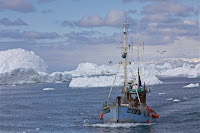Larry, Never has our blue planet been more under threat. And never before have we had a better sense of what's at stake. Come watch the latest film that will captivate and motivate you to join a global movement working to save our oceans. Greenpeace Canada is sponsoring a special Winnipeg screening of BLUE — the critically-acclaimed and award-winning documentary film which takes you deep into our planet’s threatened oceans and seas. This one-night-only screening is an on-demand event. It only takes place if 50 tickets are sold. Reserve your spot now — and portion of ticket sales will go towards supporting Greenpeace's vital work to protect our oceans and the planet. WHAT: Special screening of BLUE — an award-winning documentary film WHEN: Monday 25th June, 7pm WHERE: Cineplex Odeon McGillivray Cinemas ( 2190 McGillivray Blvd, Winnipeg, MB, R3Y 1S6 ) HOW: Tickets are $14.50 and you can order yours here




